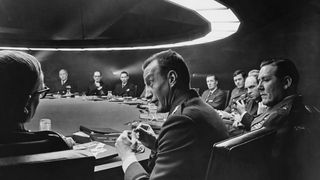Dr Strangelove or How I Learned To Stop Worrying and Love the Bomb is Stanley Kubrick’s masterpiece.
Some may argue, with more than passing justification, that Kubrick’s masterpiece is either The Paths of Glory or 2001: A Space Odyssey. It is true that these other claimants are exceptional films which have endured. But the differentiating element to Dr Strangelove is that the movie not only endures, it has a continuing relevance for the international climate of today with its heat and passion.
Released in 1964, Strangelove is the ultimate Cold War film where the stresses of the relationship between the United States and the Soviet Union and their respective allies play out against an absurd backdrop of a confrontation which should never have occurred.
The plot is disarmingly straightforward. A Strategic Air Commander, General Jack D. Ripper - brilliantly portrayed by Sterling Hayden - obsessed with the Communist threat to his vital bodily fluids, lapses into insanity and sends his wing of B-52s to attack the USSR under the auspices of Plan R for Robert. Plan R was devised to permit American commanders in the field to deploy and use nuclear weapons in the event that the White House and the customary chain of command, beginning with the President, was destroyed.
The salient reality of Strangelove is that it demonstrates beyond doubt how easy it is to slide into a war with catastrophic consequences.
The critics of Strangelove maintained that this could not happen. We now know that President Eisenhower, under pressure from his military, agreed on just such an arrangement being in force for the US nuclear deterrent. What is more, the Soviets had a similar system for their last line of defence, called Perimeter.
This is what is so remarkable about the film. Originally, Kubrick was making a drama based on Peter George’s novel Red Alert. In fact, Kubrick actually told two of his principal actors, George C. Scott (General Buck Turgidson) and Slim Pickens (Major King Kong) to play it straight. What Kubrick came to understand however, was that Strangelove would work much better as a satire and the screenplay by Terry Southern and Kubrick twisted reality a fraction of a notch.
The salient reality of Strangelove is that it demonstrates beyond doubt how easy it is to slide into a war with catastrophic consequences. In 1983, the Soviets believed that the Reagan administration was about to launch a NATO first strike upon their empire. This was only averted at the eleventh hour.
Of recent times, given confrontations from North East Asia to the Middle East to Eastern Europe, it is readily apparent that the same kinds of imperatives can come into play. The hotline between Washington and Moscow had only been recently introduced when Strangelove was released and its inadequacies are on display. The current disputes in the South China Sea sometimes lack even the crude ability for the US and China to talk that the Americans had with the Russians in the early 1960’s. The danger is obvious.
Peter Sellers plays three roles in Strangelove: The RAF liaison officer Group Captain Mandrake; President Merkin Muffley; and Strangelove himself who was a mix of Nazi rocket scientist Wenher von Braun; theoretical physicist Edward Teller; and RAND analyst Herman Kahn. Indeed, it was Kahn’s book On Thermonuclear War, which discussed surviving a nuclear onslaught that led directly to the hilarious scenes in Strangelove about humanity surviving in mineshafts.
The Cold War is a matter of history but its lessons remain chilling and real. Dr Strangelove is an echo of a reality which could quite easily assume definite form in this century’s frontiers of trouble and strife.
As a dark comedy, Strangelove works brilliantly. Spoiler alert now follows, because the best scene in the film must be said to be Slim Pickens riding the bomb down, rodeo style to its terrifying detonation. This is not only the culmination of the film, but a fitting end to Slim Pickens’ wonderful performance as the B-52 commander.
The actual end of the film involves Vera Lynn singing the British wartime favourite ‘We’ll Meet Again.’ This was suggested by Peter Sellers’ fellow Goon Spike Milligan on a visit to the set at Shepperton Studios. Kubrick was obliged to make the film in the UK due to a distinct lack of enthusiasm from the Pentagon.
The Pentagon’s preference is a cinematic footnote and is to be found in Rock Hudson’s A Gathering of Eagles, which depicts the Strategic Air Command as the US Air Forced wished it to be seen.
The Cold War is a matter of history but its lessons remain chilling and real. Dr Strangelove is an echo of a reality which could quite easily assume definite form in this century’s frontiers of trouble and strife.
A couple of weeks ago the United States Studies Centre held a screening of Dr Strangelove. A sell-out audience obviously enjoyed both the film and discussion and Q&A which followed. Later this year the USSC will screen Alan J. Pakula’s All the President’s Men, based on Woodward and Bernstein’s book concerning the Watergate Scandal and the fall of President Richard Nixon.






